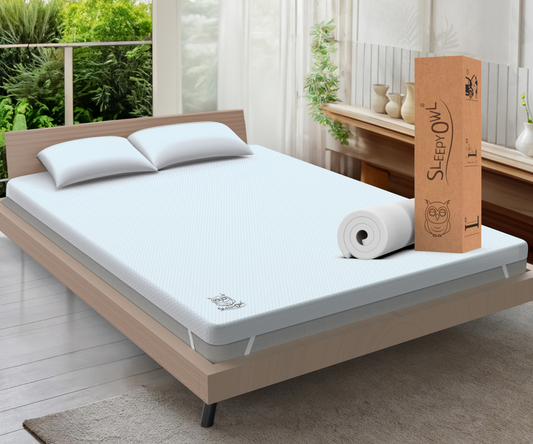Does Your Mattress Affect Sleep Quality?
Quality sleep is a fundamental pillar of overall health and well-being, often overlooked in the hustle and bustle of modern life. It is during sleep that the body undergoes critical processes such as tissue repair, muscle growth, and the regulation of hormones. Insufficient or poor-quality sleep can lead to a myriad of health issues, including obesity, cardiovascular disease, and impaired cognitive function.
The World Health Organization has even classified sleep disorders as a significant public health concern, highlighting the need for individuals to prioritise their sleep hygiene. Moreover, the psychological benefits of quality sleep cannot be understated. A well-rested mind is more capable of handling stress, making decisions, and maintaining emotional balance.
Conversely, chronic sleep deprivation can lead to anxiety, depression, and a general decline in mental health. As such, understanding the factors that contribute to quality sleep is essential for anyone looking to improve their overall quality of life. Among these factors, the choice of mattress plays a pivotal role, influencing not only comfort but also the quality of sleep one can achieve. I recently purchased a new Memory Foam Mattress Topper for my bed.
The Role of a Mattress in Quality Sleep
The mattress serves as the foundation for a good night's sleep, acting as a barrier between the sleeper and the bed frame or floor. Its primary function is to provide support and comfort, ensuring that the body is properly aligned during rest. A mattress that fails to meet these criteria can lead to discomfort and restlessness throughout the night, ultimately compromising sleep quality.
The right mattress can help alleviate pressure points, reduce tossing and turning, and promote deeper sleep cycles. Furthermore, the mattress can significantly influence temperature regulation during sleep. Many modern mattresses are designed with materials that wick away moisture and allow for airflow, helping to maintain an optimal sleeping temperature.
This is particularly important for those who tend to overheat at night or live in warmer climates. A mattress that promotes a comfortable sleeping environment can enhance the overall sleep experience, making it easier to fall asleep and stay asleep throughout the night.
Choosing the Right Mattress for Your Sleep Needs
Selecting the right mattress is a highly individualised process that requires careful consideration of personal preferences and specific sleep needs. Factors such as body weight, sleeping position, and any existing health conditions should all be taken into account when making a decision. For instance, side sleepers may benefit from a softer mattress that cushions the shoulders and hips, while back sleepers might require a firmer surface to maintain spinal alignment.
Additionally, it is essential to consider the longevity and durability of a mattress. Investing in a high-quality mattress can yield long-term benefits, as cheaper options may sag or lose their supportive qualities over time. Many manufacturers offer trial periods that allow consumers to test their mattresses at home before committing to a purchase.
This can be an invaluable opportunity to assess whether a particular mattress meets one's unique sleep requirements.
How Mattress Material Affects Sleep Quality
The material composition of a mattress plays a crucial role in determining its comfort level and overall performance. Traditional innerspring mattresses are often favoured for their bounce and support but may not provide adequate pressure relief for all sleepers. In contrast, memory foam mattresses have gained popularity due to their ability to contour to the body's shape, providing personalised support that can alleviate discomfort.
Latex mattresses are another option that combines support with breathability. Natural latex is derived from rubber trees and offers a resilient surface that maintains its shape over time. This type of mattress is often recommended for those who prefer a more eco-friendly option without sacrificing comfort.
Each material has its own set of advantages and disadvantages; therefore, understanding how these materials interact with one's body can significantly impact sleep quality.
The Impact of Mattress Firmness on Sleep
Mattress firmness is a critical factor that influences how well an individual sleeps. Firmness levels typically range from soft to extra firm, and personal preference plays a significant role in determining what feels comfortable. A mattress that is too soft may cause the body to sink too deeply, leading to misalignment of the spine and potential discomfort.
Conversely, an overly firm mattress may create pressure points that disrupt sleep. Research indicates that medium-firm mattresses often provide the best balance between support and comfort for most sleepers. They offer enough give to accommodate various sleeping positions while still providing adequate support for spinal alignment.
However, individual preferences vary widely; therefore, it is essential for consumers to test different firmness levels before making a decision.
Understanding the Relationship Between Mattress and Back Pain
Back pain is one of the most common complaints among adults, and the choice of mattress can significantly influence its severity. A mattress that does not provide adequate support can exacerbate existing back issues or even contribute to new ones. For individuals suffering from chronic back pain, it is crucial to select a mattress that promotes proper spinal alignment while also offering sufficient cushioning.
Research has shown that medium-firm mattresses are often recommended for those with back pain, as they provide a balance of support and comfort. Additionally, certain materials like memory foam can help distribute body weight evenly, reducing pressure on sensitive areas such as the lower back. It is advisable for individuals with back pain to consult with healthcare professionals when selecting a mattress to ensure they make an informed choice tailored to their specific needs.
The Benefits of Using a Memory Foam Pillow for Quality Sleep
While the mattress plays a significant role in sleep quality, pillows are equally important in ensuring proper head and neck alignment during rest. Memory foam pillows have become increasingly popular due to their ability to conform to the shape of the head and neck, providing personalised support that can enhance comfort throughout the night. These pillows help maintain spinal alignment by filling in gaps between the head and shoulders, which is particularly beneficial for side sleepers.
Moreover, memory foam pillows often feature cooling technologies that help regulate temperature during sleep. This can be especially advantageous for those who tend to overheat at night or experience night sweats. By providing both support and temperature control, memory foam pillows can significantly improve overall sleep quality.
Enhancing Sleep Quality with a Mattress Topper Double
For those who find their current mattress lacking in comfort or support, a mattress topper can be an effective solution without the need for a complete replacement. Mattress toppers come in various materials such as memory foam, latex, or gel-infused options, each offering unique benefits tailored to individual preferences. A double mattress topper can add an extra layer of cushioning that enhances comfort while also prolonging the life of an existing mattress.
In addition to improving comfort levels, mattress toppers can also help address specific sleep issues such as pressure relief or temperature regulation. For example, a gel-infused memory foam topper can provide cooling properties while still conforming to the body's shape. This versatility makes mattress toppers an excellent investment for those looking to enhance their sleep experience without committing to a new mattress.
The Connection Between Mattress and Allergies
Allergies can significantly impact sleep quality, making it essential to consider how your mattress may contribute to allergy symptoms. Dust mites, mould, and other allergens can accumulate in mattresses over time, leading to respiratory issues and disrupted sleep patterns. Choosing hypoallergenic materials can help mitigate these concerns; many modern mattresses are designed with antimicrobial properties that resist dust mites and other allergens.
Additionally, regular cleaning and maintenance of your mattress can further reduce allergen exposure. Using protective covers and washing bedding frequently are simple yet effective strategies for minimising allergens in your sleeping environment. By addressing allergy concerns related to your mattress, you can create a healthier sleeping space conducive to quality rest.
Maintaining Your Mattress for Long-Term Sleep Quality
Proper maintenance of your mattress is crucial for ensuring its longevity and continued performance over time. Regularly rotating your mattress can help prevent uneven wear and sagging, which can compromise its supportive qualities. Most manufacturers recommend rotating your mattress every three months; however, this may vary depending on the specific type of mattress you own.
In addition to rotation, keeping your mattress clean is essential for maintaining its condition. Vacuuming your mattress periodically can help remove dust and debris that accumulate over time. Spot cleaning stains promptly will also prevent them from setting in and causing long-term damage.
Investing time in proper care will not only extend the life of your mattress but also enhance your overall sleep quality.
Investing in Quality Sleep with the Right Mattress
Investing in quality sleep is one of the most significant decisions one can make for their health and well-being. The right mattress plays an integral role in achieving restful slumber by providing support, comfort, and temperature regulation tailored to individual needs. With various materials and firmness levels available on the market today, consumers have more options than ever before when it comes to selecting a mattress that suits their unique preferences.
By understanding how different factors such as material composition, firmness level, and maintenance practices affect sleep quality, individuals can make informed choices that lead to better rest and improved overall health. Ultimately, prioritising quality sleep through thoughtful investment in a suitable mattress will yield long-term benefits that extend far beyond mere comfort during the night.
FAQs
What is the importance of a mattress for quality sleep?
A mattress plays a crucial role in determining the quality of sleep as it provides support and comfort to the body, allowing for proper spinal alignment and pressure relief.
How does a mattress affect sleep quality?
A mattress that is too firm or too soft can lead to discomfort, pain, and disrupted sleep. A supportive and comfortable mattress can promote better sleep quality by allowing the body to relax and rest properly.
What are the signs that indicate a mattress is affecting sleep quality?
Signs that a mattress is affecting sleep quality include waking up with aches and pains, feeling tired despite getting enough sleep, and experiencing difficulty falling or staying asleep.
How often should a mattress be replaced for optimal sleep quality?
It is recommended to replace a mattress every 7-10 years, as over time it can lose its support and comfort, leading to a negative impact on sleep quality.
What are the factors to consider when choosing a mattress for quality sleep?
Factors to consider when choosing a mattress for quality sleep include firmness, materials, support, and individual preferences such as sleeping position and body weight.


